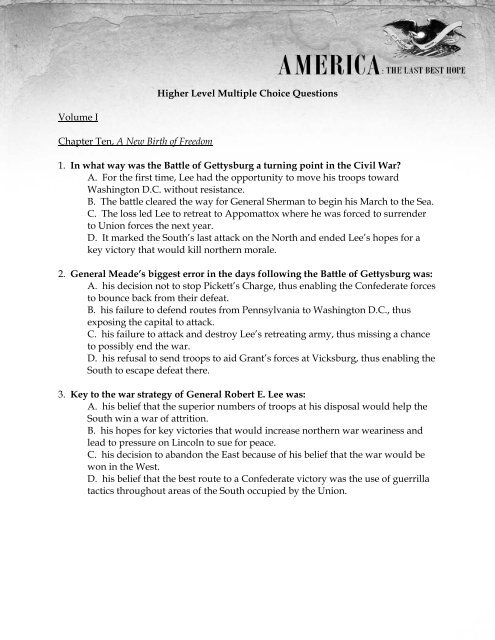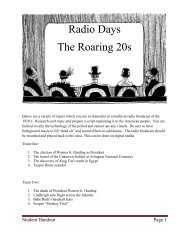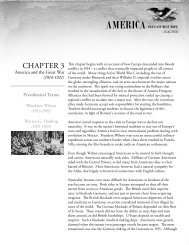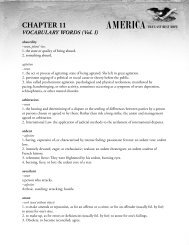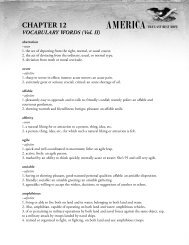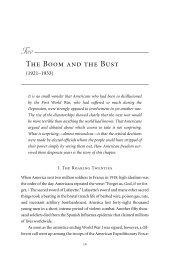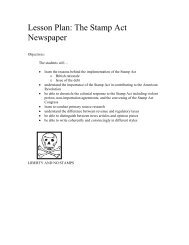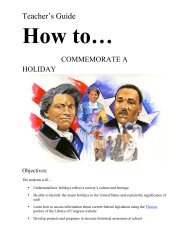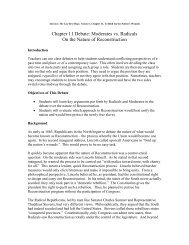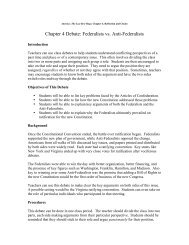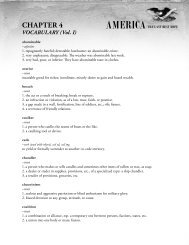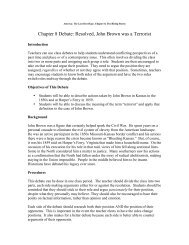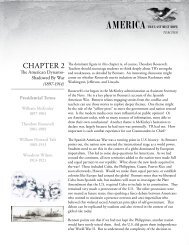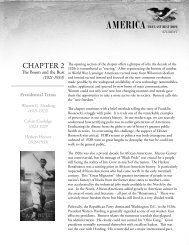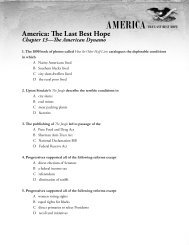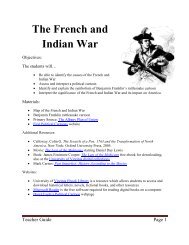Chapter 10 Higher Level Multiple Choice Questions - Last Best Hope
Chapter 10 Higher Level Multiple Choice Questions - Last Best Hope
Chapter 10 Higher Level Multiple Choice Questions - Last Best Hope
Create successful ePaper yourself
Turn your PDF publications into a flip-book with our unique Google optimized e-Paper software.
<strong>Higher</strong> <strong>Level</strong> <strong>Multiple</strong> <strong>Choice</strong> <strong>Questions</strong>Volume I<strong>Chapter</strong> Ten, A New Birth of Freedom1. In what way was the Battle of Gettysburg a turning point in the Civil War?A. For the first time, Lee had the opportunity to move his troops towardWashington D.C. without resistance.B. The battle cleared the way for General Sherman to begin his March to the Sea.C. The loss led Lee to retreat to Appomattox where he was forced to surrenderto Union forces the next year.D. It marked the South’s last attack on the North and ended Lee’s hopes for akey victory that would kill northern morale.2. General Meade’s biggest error in the days following the Battle of Gettysburg was:A. his decision not to stop Pickett’s Charge, thus enabling the Confederate forcesto bounce back from their defeat.B. his failure to defend routes from Pennsylvania to Washington D.C., thusexposing the capital to attack.C. his failure to attack and destroy Lee’s retreating army, thus missing a chanceto possibly end the war.D. his refusal to send troops to aid Grant’s forces at Vicksburg, thus enabling theSouth to escape defeat there.3. Key to the war strategy of General Robert E. Lee was:A. his belief that the superior numbers of troops at his disposal would help theSouth win a war of attrition.B. his hopes for key victories that would increase northern war weariness andlead to pressure on Lincoln to sue for peace.C. his decision to abandon the East because of his belief that the war would bewon in the West.D. his belief that the best route to a Confederate victory was the use of guerrillatactics throughout areas of the South occupied by the Union.
4. What most motivated rioters in New York City in 1863?A. Anger over the fact that poor men faced the draft while rich men could pay afee and be exempt.B. The belief that the Union had very little chance to win the war in the wake ofrecent losses to Confederate forces.C. Distress over job losses caused by the economic depression that accompaniedthe war.D. The newly passed law by Congress that increased the draft age to 40.5. Which of the following most closely reflects the meaning Lincoln hoped listenerswould derive from his Gettysburg Address?A. Now that the war had been won, it was up to the North to rebuild the Southand make it prosperous again.B. The survival of the American experiment in self-government and equality isat stake in the war.C. The Union deaths at Gettysburg must be justified by an all-out effort to defeatthe South.D. It was now time to grant full-citizenship to former slaves who had been freedby the Emancipation Proclamation.6. General Ulysses S. Grant differed from other Union generals in that:A. he believed the North could win by strengthening the blockade of the Southand causing their civilians to suffer.B. he tended toward caution so as to avoid a big defeat that would hurt moralein the North.C. he was willing to see his army suffer horrible casualties in order to defeat theSouth and end the war.D. he ignored the Confederate capital and instead focused on winning the warin the West.7. Which of the following most reflects the sentiments of the Copperheads duringthe Civil War?A. They believed that the Confederate government should arm slaves as a lastditch effort to win the war.B. They pushed for one last push by Lee to attack the North and kill the moraleof its citizens.C. They wanted a punitive war that included total emancipation and civil rightsfor the slaves of the South.D. They believed in ending the war and its incredible suffering by seeking peaceterms with the South.
8. Frederick Douglass lobbied hard for the use of black soldiers in the Union armybecause:A. he knew that without their participation, the Union army would be outnumberedby the Confederate army.B. he believed that only such a measure would put northern blacks and formerslaves in the South in a position to demand full citizenship in the U.S.C. he believed this policy would inspire slaves in the South to flee toward theNorth in mass numbers.D. he hoped that as soldiers with the right to vote, they would elect African-American leaders to Congress.9. What was General Sherman’s primary goal in his famous “March to the Sea?”A. He hoped that by killing civilians, southern leaders would finally beconvinced to surrender.B. He hoped to put an end to the South’s blockade running efforts.C. He wanted to bring the war to the people of the South and thus kill theirwillingness to continue the war.D. He hoped that by taking New Orleans, the South could be further deprived ofneeded goods from abroad.<strong>10</strong>. Which phrases appeared in Lincoln’s second inaugural address in 1865?A. “bring Confederate leaders to justice,” “all men everywhere will be free”B. “reconstruct the nation under northern rule,” “use all resources to win thewar at hand”C. “bring the conquered provinces back into the Union,” “wayward sistersdepart in peace”D. “just and lasting peace,” “with malice toward none”


